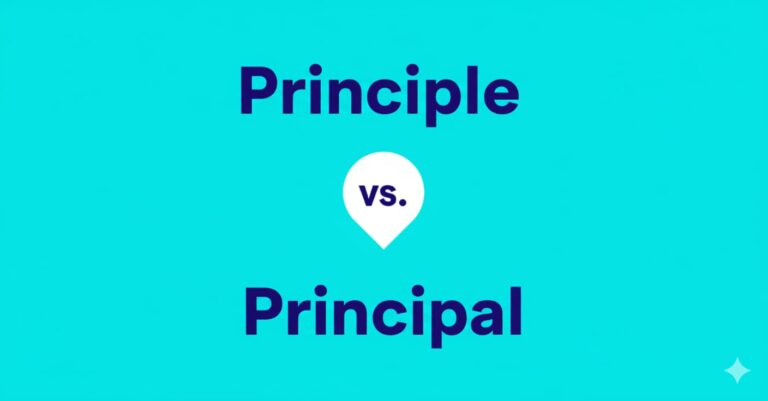If you’ve ever paused mid-sentence wondering, “Should I write principle or principal?”, you’re far from alone. These two words are homophones—they sound exactly the same—but their meanings are quite different. Misusing them can change the sense of a sentence completely. Luckily, once you understand the difference and learn a few easy tricks, you’ll be able to use them with confidence.
This article breaks down the definitions, explains how to use each word in real-life contexts, and shares simple memory aids to help you remember. By the end, you’ll never hesitate between principle and principal again.
Learn the difference between principle and principal
At the simplest level:
- Principle is always a noun, and it refers to a rule, belief, or fundamental truth.
- Principal can be an adjective meaning “main” or “most important,” or a noun referring to a person in a position of authority (such as the head of a school) or to the original amount of money in a loan or investment.
Think of it this way:
- Principle = rule or belief.
- Principal = main person or main thing.
This distinction may sound straightforward, but it helps to look at each word in more detail, with examples that make the differences crystal clear.
How to use principle
The word principle always points to an idea, concept, or standard of behavior. You can think of it as the underlying truth or value that guides actions. It is never used to describe a person or a physical object—only abstract rules or beliefs.
For example:
- She refused to cheat on the test because it went against her principles.
- The theory is based on the principle of cause and effect.
- Freedom of speech is a core principle of democracy.
These examples show how principle functions as a guiding rule, whether in personal ethics, science, or social values.
Some useful synonyms for principle include: rule, guideline, belief, law, tenet, doctrine, or standard. Using synonyms can help reinforce meaning and also keep your writing varied.
How to use principal
The word principal wears more hats than principle, which makes it a little trickier. Let’s look at its main uses.
Principal as an adjective
As an adjective, principal means “most important” or “primary.” You’ll often see it used in formal writing, business contexts, or academic discussions.
- His principal reason for leaving was a lack of career growth.
- The principal challenge for the team was meeting the tight deadline.
- Climate change is one of the principal concerns of our time.
In each of these sentences, principal identifies the leading or most significant factor.
Principal as a noun
As a noun, principal can mean two very different things depending on context:
- A person in authority, most commonly the leader of a school:
- The principal announced new safety policies for the campus.
- Parents met with the principal during open house night.
- The original sum of money in finance, not including interest:
- She paid back the loan principal plus interest.
- Investors often want to protect their principal even if returns are low.
Because of these different meanings, principal is a versatile word. But regardless of whether you’re talking about a school leader or money, the core idea is “the main person” or “the main amount.”
Some synonyms for principal (when used as adjective) include: main, chief, primary, head, foremost, or central. When used as a noun, synonyms depend on context—“head” or “leader” for a person, and “capital” or “sum” for money.
Exceptions to the general rules for principle vs. principal
Unlike some confusing pairs in English, principle and principal don’t often cross into each other’s territory. The distinction remains pretty clean: one refers to a rule, the other to importance, leadership, or money.
The main “exception” is simply remembering that principal functions both as a noun and an adjective, while principleonly functions as a noun. That’s why many people hesitate—the word principal changes depending on how it’s used in a sentence.
Here are some memory tricks to help you keep them straight:
- Principle ends with “-le,” just like rule. This can remind you that principle always refers to a rule or truth.
- Principal contains the word pal. Think of your school principal as your “pal”—a person, not a rule.
- When dealing with money, remember that your principal investment is the “main” amount you don’t want to lose.
These associations may sound simple, but they’re surprisingly effective once you start using them.
Principle vs. Principal FAQs
What does principle mean?
Principle is a noun that refers to a rule, belief, law, or moral guideline. It never describes a person or a physical object—only ideas or truths.
What does principal mean?
Principal has multiple meanings. As an adjective, it means “main” or “most important.” As a noun, it can refer to the head of a school or the original amount of money in a loan or investment.
How do you remember the difference between principle and principal?
An easy trick is to focus on the endings. Principle ends in “-le” like rule, so it refers to a belief or law. Principal has “pal” in it—so you can think of your principal at school as your pal. It also works to remember that principal = primary or main.
Is principal ever used like principle?
Not in standard usage. They are separate words with different meanings, and using them interchangeably is considered incorrect.

Leave a Reply